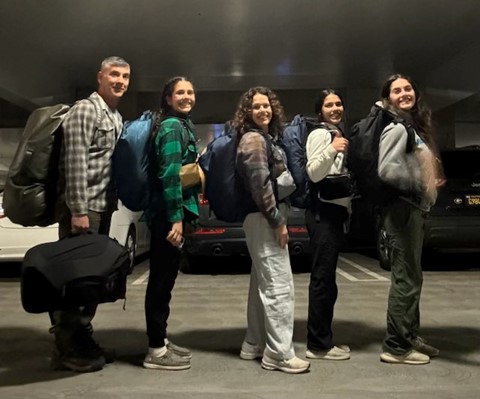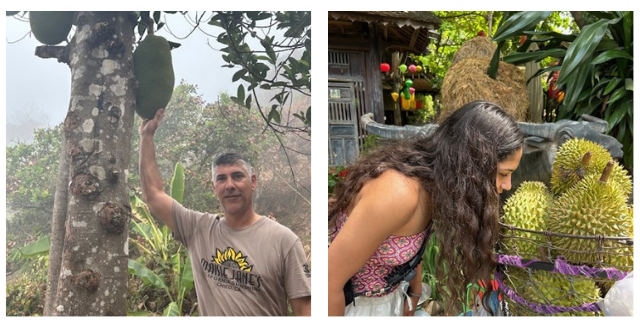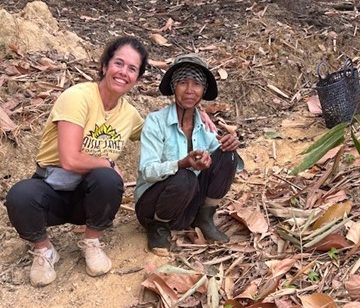
Posted on : April 26th, 2024
Did you know that the best cashews in the world are grown in Vietnam? At least for Maisie Jane’s handcrafted cashew products, we think so! Cashews need seasonally dry tropical climates to thrive, therefore they aren’t at their best when grown in the United States.

Maisie Jane and Isidro fascinated with the fresh cashews and cashew fruit in Vietnam.
The Peak Cashew harvest season is March-April during the dry season of Vietnam. For years our family has yearned to learn firsthand about the cashews our family business uses in our specialty cashew products and to connect with our growers and processors. This past March that dream came true! The five Hurtado’s packed our bags and headed to the beautiful tropical country of Vietnam!

Hurtado Family headed to Vietnam.
Traveling 12075km, (7,503 miles), and 23 hours of travel we arrived at the beautiful city of Hoi An, Vietnam, located on the country’s central coast. Scattered with lush tropical landscapes of bananas and coconut trees, patches of rice fields, bustling streets of buzzing mopeds, and the warm smiles and hospitable Vietnamese people, we instantly fell in love with this country. Expecting severe humidity getting off the airplane we were pleasantly surprised with the dryness. I guess that’s one benefit of traveling there during their dry season-the humidity isn’t unbearable!
We traveled 5 hours west of Saigon, just east of the Cambodia border to arrive at the very rural area that borders the Cat Tien National Park, where a good amount of our cashews are grown.

Woman from Chau Ma tribe weaving using her Bonapasa.
The streets are narrow and alongside are the humble dwellings of one of the native Vietnam tribes, the Chau Ma’s. We learned how to make their traditional clothing created using beautiful patterns distinct to their tribe using the’ Bonapasa’, which is their weaving structure. The Hurtado girls all gave it a try and learned to appreciate their native textiles with the elaborate process of this weaving technique.
The Vietnamese farmer owns on average 1-3 hectares, which is equivalent to about 2.5-7.4 acres. We learned that farmers there are very diverse. On their land not only do they have cashew trees, but they are also Farming, coffee, and other tropical fruits such as Longan, Dragon Fruit, Durian, and the largest fruit in the world, Jackfruit. Other top commodities grown by Vietnam farmers that are exported are coffee, rubber, and paper pulp derived from Eucalyptus trees.

Isidro with a Jackfruit and Natalia smelling a Durian fruit.
We woke up at 5 am and headed on bikes to arrive at a dirt road where we hiked to the top of a mountain arriving at a family’s cashew farm. As peak harvest time was upon them, I was expecting to see and hear some equipment in the cashew orchards. On the contrary, in the misty morning dew atop the mountain stillness was abreast with only the sounds of cackling distant chickens from the dwellings at the bottom of the mountain.

Cashews on the tree.
Instead of the American farming way of high output demands using industrial and mechanical means to farm and harvest, we saw the Vietnamese family members crouched down and hand-picking from the ground the cashew fruit, or ‘apple’ moving like spiders on the hillside. With a basket alongside the farmers, they remove the cashew ‘apple’ from the cashew seed by twisting and pulling it off with vigorous effort.

Cashew Orchard on a Misty morning.
The cashew fruit is edible. I enjoyed the juicy sweetness of its flesh, but the skin was not to be desired being very bitter. The cashew fruit is not marketed since they are overripe by the time they fall to the ground. The Vietnamese farmers do not shake the trees, rather they wait for them to naturally fall. This means the farmers are constantly walking and hand-picking the same cashew fruit orchard during the two-month peak season of harvest to ensure they gather all their crop’s yield.

Maisie Jane with Cashew Farmer.
The farmers compile their cashew crops in jute bags and sell them to their processors. The Cashew nut has a very hard outer shell that protects the Cashew nut with not only its shell but also a protective tar-like barrier. It takes very special equipment to remove the cashew shell and clean this ‘tar’ from the nut. After this step, they are thoroughly inspected for imperfections, graded, sized, and packed for export. Maisie Jane’s then receives containers of these very special nougats of nutrition in Northern California. Traveling to Vietnam was a wonderful experience. We enjoyed the culture, the food, and most of all the people.

Hurtado girls and Isidro in the Cashew plant.
The Vietnamese are humans with great pride in their beautiful country and are so happy to share their bounty with the rest of the world. It is exciting to share all this will indulge and appreciate all the hard work that goes into our Cashew Butter, which is 100% pure: no added oils, salt, or sweeteners! Just pure smooth, rich, delicious Vietnamese cashews roasted to perfection and to be enjoyed by the spoonsful!
Yours Truly,
Maisie Jane.